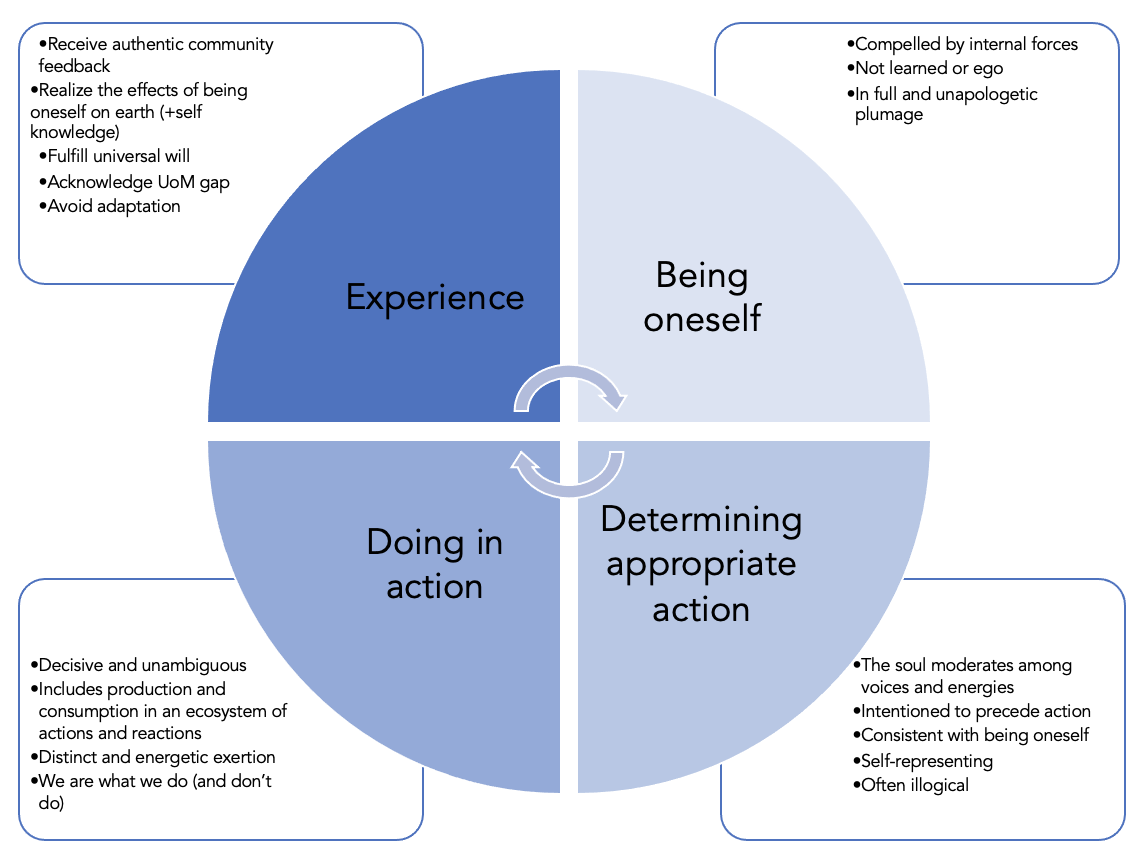Often folks will differentiate between existing and living, where the former essentially completes what’s in your calendar, and the latter follows something more meaningful. To able to pursue a meaningful life, I’ve created the image you see – here’s the lowdown.
- The ancient Greeks instructed us to “know thyself.” Polonius in Shakespeare’s Hamlet instructed “to thine own self be true.” Does this mean that we know we like to be comfy and thus ought to head to Lululemon to buy some sweats? Not quite. We are born untainted and untaught, and without the norms and values we acquire or the adaptations we make to pain and hurt. I have argued that our soul speaks to us as one of the many voices in our consciousness, and it attempts to steer us to the actions that are authentic to our being. We ignore it because we are taught to listen more seriously to what our peers expect from us and our parents impose on us, to name a couple. After all, we’ve got to pay the bills and save money to retire.
I have also argued that like every other thing in the multiverse we are subject to forces. Like magnetism, we are naturally drawn to and repulsed by things in ways that are beyond our control. I am drawn to pickles, mustard, and other vinegary things. I am repulsed by people dressing up animals. I didn’t learn these things, they’ve always been a part of me. Yes it is very likely that my vinegar attraction is related to my form and it’s needed to thin my blood, but either way , it’s not learned. It’s not based on fear or greed, which is what compels a great deal of human action today. Knowing thyself comes from separating what is natural to us as ourselves, versus what is learned or adapted. Doing this exercise requires brutal honesty because it’ll jettison most belief systems in a finger snap and create massive cognitive dissonance as a result.
Once you know who you are, and are a being of your forces and the universe’s will, your job is to be that. In fact your job or purpose is to be that as best you can be. If you’re a miserable crank because you were born that way, be that. Don’t try to be kind and upbeat because you are denying your being its role in the universal plan, and that will feel awful and phony. The ‘thinking-doing gap’ describes the gap between what people think and what they do. Like if they want to lose weight yet eat chocolate cake, that’s the gap. Being true to thine self means having the courage to be who you are despite the predictable reaction you’ll receive from your peers, parents, or society. Cyndi Lauper wants to see your true colours and you should too.
2. The next step in living is to decide how to act. Inside of you are many voices, often contradictory, to assist you to be seen in the best light while getting the best outcome. Colloquially you’ve got your heart, head, ego, soul, little devil (id), peer norms, societal norms, community norms, etc., all blabbing at you at various volumes, many of which are very convincing. You are the captain of your ship, able to hear all these voices and determine how you’re going to run your ship. You are able to set sail on a certain course and intention an outcome that takes everything into account and plots a course. Sometimes this destination is illogical, and that’s quite okay, as long as it’s…..true to you. As long as you’re representing yourself. Your job is to be you without fail, this step is about picking the way that’s most you, and let’s face it, you’re ridiculous.
3. Step 3 is taking action. I have many times stressed the importance of exercising your will in action, and how too much of life exists only in our heads. I have spoken about the couch of comfort, and that it takes decisive energetic mobilization to get off that couch. Action demonstrates your intentions in the strongest possible way by being unambiguous and in conflict with other wills.
I have also mentioned that regarding action, production continues to be a far more satisfying action than consumption. It is often a flow activity, and where we find the greatest bliss. Consumption is like eating. It feels good at the time but the experience and its consequent emotions are fleeting. Production (and flow) remove the barrier between us and our environment, and remove the notions of time and self, to provide an experience immersive and harmonious.
4. The final step is experience, which is both real-time and retrospective. This provides you with the feedback of what it’s like to be you in your environment, triangulated by whatever bystanders and judges wish to share as feedback. This is where you get to truly understand what it’s like to be you. That’s not to say that a bunch egotistical judges are a great experience, but you’re here on earth and this is what you’re in store for.
Experiences that don’t jive with our desires tend to motivate change. Don’t change. You can tweak the next time you think about your actions, but only to be more authentically who you are. The universe imbued you with your soul, and your soul is formed from the same matter that forms stars and planets. They’re all doing their job in fulfilling the will of the universe; do you think you’re better than a star? Perhaps you are because unlike a star, you can actually decide to be something different. Don’t.



